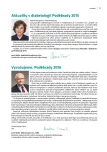-
Medical journals
- Career
“Healthy behaviour” and mental resilience in youth within the Diateens project
Authors: Viera Cviková 1; Adriana Ilavská 2
Authors‘ workplace: Katedra psychológie Filozofickej fakulty Univerzity Komenského Bratislava, Slovenská republika 1; Medispektrum s. r. o., Bratislava, Slovenská republika 2
Published in: Vnitř Lék 2016; 62(3): 229-232
Category: Actualities
Overview
Približne každý piaty Slovák je obézny a každý druhý má nadváhu. Z tohto dôvodu bol realizovaný projekt Diateens – projekt pre mládež na prevenciu diabetes mellitus. Záštitu nad projektom prevzala Slovenská diabetologická spoločnosť a slovenská kancelária WHO ako jeden z edukačných programov v rámci Národného diabetologického programu. Cieľom projektu bolo zlepšiť informovanosť mladých ľudí o ochorení diabetes mellitus, zmapovať ich zdravotný stav a podporiť zdravý životný štýl (zdravé správanie) ako významný komponent v prevencii proti uvedenému ochoreniu.
Kľúčové slova:
diabetes mellitus – Diateens – nadváha – obezita – prevencia – zdravie podporujúce správanie
Sources
1. Glanz K, Rimer BK, Viswanath K (eds). Health Behavior and Health Education: Theory, Research, and Practice. 4th ed. Jossey-Bass: San Francisco 2008. ISBN 978–0787996147.
2. Šolcová I. Vývoj resilience v dětství a dospělosti. Grada: Praha 2009. ISBN 978–80–247–2947–3.
3. Paulík K. Psychologie lidské odolnosti. Grada: Praha 2010. ISBN 978–80–247–2959–6.
4. Luszczynska A, Schwarzer R. Social cognitive theory. In Conner M, Norman P (eds). Predicting health behavior. Open University Press: Berkshire (England) 2005 : 127–169. ISBN 978 0335 21176 0.
5. Bandura A. Self-efficacy. In Corsini RJ (ed.). Encyclopedia of psychology (Corsini Encyclopedia of Psychology and Behavioral Science). Vol. 3. 2nd ed. Wiley: New York 1994 : 368–369. ISBN 9780471558194.
6. Bandura A. Self-efficacy: The exercise of control. W. H. Freeman: New York 1997. ISBN 978–0716728504
7. Kebza V. Psychosociální determinanty zdraví. Academia: Praha 2005. ISBN 80–200–1307–5.
8. Janoušek J. Sociálně kognitivní teorie Alberta Bandury. Cs Psych 1992; 36(5): 385–398.
9. Zalewska-Puchala J, Majda A, Galuszka A et al. Health behavior of students versus a sense of self-efficacy. Adv Med Sci 2007; 52(Suppl 1): 73–77.
10. Jackson ES, Tucker CM, Herman KC. Health value, perceived social Support, and health self-efficacy as factors in a health-promoting lifestyle. Journal of American College Health 2007; 56(1): 69–74. Dostupné z DOI: http://dx.doi.org/10.3200/JACH.56.1.69–74.
11. Dzewaltowski DA, Noble JM, Shaw JM. Physical Activity Participation: Social Cognitive Theory Versus the Theories of Reasoned Action and Planned Behavior. JSEP 1990; 12(4): 388–405.
12. Prochaska JO. A stage paradigm for integrating clinical and health approaches to smoking cessation. Addict Behav 1996; 21(6): 721–732.
13. Clark MM, Abrams DB, Niaura RS et al. Self-efficacy in weight management. J Consult Clin Psychol 1991; 59(5): 739–744.
14. Kočš M, Heftyová M. Schwarzer R et al. Slovakian adaptation of the general self-efficacy scale. 1993. Dostupné z http://userpage.fu-berlin.de/~health/slovak.htm. [20.03.2014].
15. Glanz K, Rimer BK, Viswanath K (eds). Health Behavior and Health Education: Theory, Research, and Practice 5th ed. Jossey-Bass: San Francisco 2015. ISBN: 978–1-118–62898–0.
Labels
Diabetology Endocrinology Internal medicine
Article was published inInternal Medicine

2016 Issue 3-
All articles in this issue
- Obesity paradoxes
- Clinical aspects of pharmacological treatment of diabetic neuropathy – cooperation with neurologists and diabetologists
- Pharmacogenetics of oral antidiabetic treatment
- Cholesterol metabolism in patients with type 2 diabetes
- Victoza changes diabetes and lives of patients 5 years already
- XIGDUO – fixed combination of the active ingredients dapagliflozin and metformin
- Diabetes mellitus and pancreas cancer
- Early detection of ISHD in diabetic patients and determining the type of treatment
- What is the significance of the phenomenon of hypertension in disguise in patients with type 2 diabetes mellitus treated for long-lasting hypertension?
- Management of type 2 diabetes mellitus therapy in a mature age
- Motor vehicle driving and diabetes mellitus – medical aspects
- Motor vehicle driving and not only diabetes mellitus – certain aspects of the legislations in the Czech Republic
- “Healthy behaviour” and mental resilience in youth within the Diateens project
- Internal Medicine
- Journal archive
- Current issue
- Online only
- About the journal
Most read in this issue- Victoza changes diabetes and lives of patients 5 years already
- Motor vehicle driving and diabetes mellitus – medical aspects
- Diabetes mellitus and pancreas cancer
- Obesity paradoxes
Login#ADS_BOTTOM_SCRIPTS#Forgotten passwordEnter the email address that you registered with. We will send you instructions on how to set a new password.
- Career

